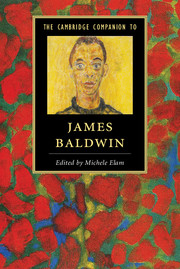
-
Select format
-
- Publisher:
- Cambridge University Press
- Publication date:
- May 2015
- April 2015
- ISBN:
- 9781107337725
- 9781107043039
- 9781107618183
- Dimensions:
- (228 x 152 mm)
- Weight & Pages:
- 0.57kg, 274 Pages
- Dimensions:
- (228 x 152 mm)
- Weight & Pages:
- 0.39kg, 274 Pages
You may already have access via personal or institutional login
Book description
This Companion offers fresh insight into the art and politics of James Baldwin, one of the most important writers and provocative cultural critics of the twentieth century. Black, gay, and gifted, he was hailed as a 'spokesman for the race', although he personally, and controversially, eschewed titles and classifications of all kinds. Individual essays examine his classic novels and nonfiction as well as his work across lesser-examined domains: poetry, music, theatre, sermon, photo-text, children's literature, public media, comedy, and artistic collaboration. In doing so, The Cambridge Companion to James Baldwin captures the power and influence of his work during the civil rights era as well as his relevance in the 'post-race' transnational twenty-first century, when his prescient questioning of the boundaries of race, sex, love, leadership, and country assume new urgency.
Reviews
‘The Companion … addresses Baldwin's work in relation to his social and political contexts, as well as examining lesser-studied aspects of his oeuvre, including his collaborations, his poetry, and - best of all - his humour.’
Rona Cran Source: The Times Literary Supplement
Contents
Metrics
Altmetric attention score
Full text views
Full text views help Loading metrics...
Loading metrics...
* Views captured on Cambridge Core between #date#. This data will be updated every 24 hours.
Usage data cannot currently be displayed.
Accessibility standard: Unknown
Why this information is here
This section outlines the accessibility features of this content - including support for screen readers, full keyboard navigation and high-contrast display options. This may not be relevant for you.
Accessibility Information
Accessibility compliance for the PDF of this book is currently unknown and may be updated in the future.


